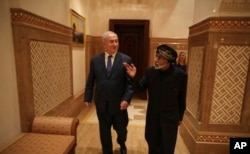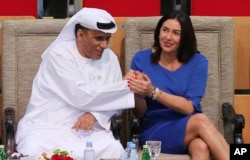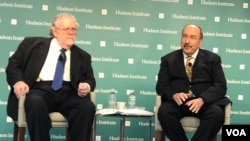Israel is eyeing Bahrain as the next Gulf Arab state to publicly welcome Israeli officials after two others did so in recent weeks, signaling closer Israeli-Arab ties in the face of their mutual concerns about Iran.
In reports published Sunday and Monday, Israeli media quoted unnamed officials as saying Israel and Bahrain are working toward establishing formal diplomatic ties. Israel'sYediot Ahronot newspaper quoted those officials as saying Bahrain also is likely to host Israeli Prime Minister Benjamin Netanyahu's next public visit to an Arab state with whom Israel has no formal relations.
Netanyahu made a previously unannounced trip to Oman Oct. 25-26 for talks with its leader, Sultan Qaboos Bin Said, a visit later publicized by both sides, who also have no diplomatic ties. It was the first such trip by an Israeli leader to Oman since 1996.
Netanyahu and Sultan Qaboos issued a joint statement saying the two sides "discussed ways to advance the Middle East peace process and discussed a number of issues of mutual interest to achieve peace and stability in the Middle East."
Oman later hosted Israeli Intelligence and Transportation Minister Yisrael Katz, who met several Arab ministers on Nov. 6 to brief them on his plan for a railway connecting the Gulf to the Mediterranean via Israel and Jordan.
The United Arab Emirates, which like Oman has no formal relations with Israel, took the unusual step of welcoming two other Israeli ministers in late October. Israeli Culture Minister Miri Regev traveled to Abu Dhabi to cheer on gold medal-winning Israeli judokas at an international judo tournament, while Israeli Communications Minister Ayoub Kara went to Dubai for an international telecommunications conference.
Speaking Sunday at a joint news conference with visiting Chadian President Idriss Déby, Netanyahu said there would be more such visits to Arab states soon, without elaborating. The only Arab states that recognize Israel are Egypt and Jordan.
In another sign that Bahrain may soon publicly welcome an Israeli official, the Reuters news agency said Israeli Economy Minister Eli Cohen told Israeli Army Radio on Monday that he has received an invitation to a Bahraini-hosted conference. Cohen did not say if he would travel to the Global Entrepreneurship Congress in Bahrain next April, and there was no confirmation of the invitation from Bahraini officials.
Unpublicized visits by Israeli security officials to Arab states have been common in the last five years, according to former Israeli Ambassador to the U.N. Dore Gold, who now heads the Jerusalem Center for Public Affairs.
"What really changes the situation in the region is the willingness to do that in public. That is the new reality," Gold told an audience at Washington's Hudson Institute on Tuesday.
Gold said Shiite-majority Iran's support of Shiite militants throughout the region has "scared the hell" out of Sunni Arab-led states neighboring Israel.
"It is the fear of hegemonic ambitions of non-Arab powers Iran and Turkey in the Middle East that gives us and the Arabs a certain common ground to speak about," Gold said.
Gold, who served as an ambassador at the U.N. from 1997 to 1999 and as director general of Israel's foreign ministry from 2015 to 2016, said Arab nations have little reason to see the Jewish state as a threat.
"We're not seeking to create a Hebrew empire, although I think our non-Arab neighbors do have broad ambitions that you have to keep your eye on."
This article originated in VOA's Persian service.







